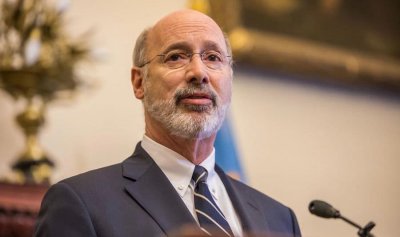Democratic Governor Tom Wolf is calling for recreational cannabis legalization in the state of Pennsylvania in an effort to promote COVID-19 economic recovery. Wolf’s proposed plan would use tax revenues generated from legal sales to aid existing small businesses. The governor also wants portions of cannabis tax funds to be directed toward helping historically disadvantaged businesses and to “further restorative justice programs that give priority to repairing the harm done to crime victims and communities as a result of marijuana criminalization.”
Wolf believes cannabis legalization, as well as other critical initiatives, are long overdue. “House and Senate Democrats have been fighting for these things for years, and certainly since the beginning of the pandemic,” he said. “They’ve been stopped at every turn by the Republicans who’ve been focused on ignoring the public health crisis and actually trashing me. That has to stop. We’ve got to get back to doing things that actually matter to people.”
Medicinal cannabis use in Pennsylvania was legalized in 2016 and became operational in 2018. Since the onset of the coronavirus pandemic, medicinal cannabis sales in the state have risen dramatically. In February, the number of patient visits to dispensaries per week was 70,000. In August, that number rose to 120,000 visits. Overall, there are approximately 230,000 registered patients in the Keystone State.
“The program is doing really well,” Chris Woods, chief executive officer at Terrapin Care Station, told Inquirer.com. “It’s hard not to draw a correlation with COVID-19. In unsettled times, cannabis is a medicine that seems to help people cope with anxiety.”
In addition to the possible increase in demand for cannabis during the pandemic, a physician’s recommendation for cannabis can be now be accessed online, something that is very useful for patients who may not be physically well enough to travel to a doctor.
Members of the industry, including several directors from NORML, have praised Wolf’s call for legalization.
“It makes no sense from a public health perspective, a fiscal perspective, or a moral perspective to perpetuate the prosecution and stigmatization of tens of thousands of Pennsylvanians annually simply for minor marijuana possession offenses,” NORML’s Deputy Director Paul Armentano said. “The Governor is to be commended for recognizing that the establishment of a pragmatic regulatory framework that allows for the legal, licensed commercial production and retail sale of marijuana to adults is preferable to the failed policy of criminalization, and for also acknowledging the need to right the past wrongs of prohibition—which far too often fall disproportionately upon young people, poor people, and people of color.”
Wolf believes cannabis legalization, as well as other critical initiatives, are long overdue. “House and Senate Democrats have been fighting for these things for years, and certainly since the beginning of the pandemic,” he said. “They’ve been stopped at every turn by the Republicans who’ve been focused on ignoring the public health crisis and actually trashing me. That has to stop. We’ve got to get back to doing things that actually matter to people.”
Medicinal cannabis use in Pennsylvania was legalized in 2016 and became operational in 2018. Since the onset of the coronavirus pandemic, medicinal cannabis sales in the state have risen dramatically. In February, the number of patient visits to dispensaries per week was 70,000. In August, that number rose to 120,000 visits. Overall, there are approximately 230,000 registered patients in the Keystone State.
“The program is doing really well,” Chris Woods, chief executive officer at Terrapin Care Station, told Inquirer.com. “It’s hard not to draw a correlation with COVID-19. In unsettled times, cannabis is a medicine that seems to help people cope with anxiety.”
In addition to the possible increase in demand for cannabis during the pandemic, a physician’s recommendation for cannabis can be now be accessed online, something that is very useful for patients who may not be physically well enough to travel to a doctor.
Members of the industry, including several directors from NORML, have praised Wolf’s call for legalization.
“It makes no sense from a public health perspective, a fiscal perspective, or a moral perspective to perpetuate the prosecution and stigmatization of tens of thousands of Pennsylvanians annually simply for minor marijuana possession offenses,” NORML’s Deputy Director Paul Armentano said. “The Governor is to be commended for recognizing that the establishment of a pragmatic regulatory framework that allows for the legal, licensed commercial production and retail sale of marijuana to adults is preferable to the failed policy of criminalization, and for also acknowledging the need to right the past wrongs of prohibition—which far too often fall disproportionately upon young people, poor people, and people of color.”




